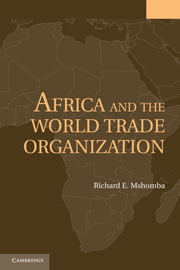Book contents
- Frontmatter
- Contents
- List of Tables and Figures
- Acknowledgments
- List of Abbreviations
- Map of Africa
- 1 INTRODUCTION
- 2 DISPUTE SETTLEMENT UNDERSTANDING
- 3 TRADE-RELATED ASPECTS OF INTELLECTUAL PROPERTY RIGHTS
- 4 AGRICULTURE IN THE DOHA ROUND
- 5 TRANSPARENCY IN GOVERNMENT PROCUREMENT
- 6 AID FOR TRADE
- 7 CONCLUSION
- Bibliography
- Index
7 - CONCLUSION
Published online by Cambridge University Press: 27 February 2010
- Frontmatter
- Contents
- List of Tables and Figures
- Acknowledgments
- List of Abbreviations
- Map of Africa
- 1 INTRODUCTION
- 2 DISPUTE SETTLEMENT UNDERSTANDING
- 3 TRADE-RELATED ASPECTS OF INTELLECTUAL PROPERTY RIGHTS
- 4 AGRICULTURE IN THE DOHA ROUND
- 5 TRANSPARENCY IN GOVERNMENT PROCUREMENT
- 6 AID FOR TRADE
- 7 CONCLUSION
- Bibliography
- Index
Summary
the discussion in this book has focused on understanding and analyzing some of the WTO agreements and proposals in the context of Africa. It is not possible to describe the relationship between African countries and the WTO precisely, as one might when describing the relationship between two mutually exclusive entities. African countries are an important part of the WTO, constituting 28 percent of the membership (42 of 152 members in 2007).
Many overlapping coalitions exist within the WTO, including the African Group. While at some level each WTO member negotiates on its own behalf, negotiations are typically between one coalition or a set of coalitions and other coalitions, depending on the agenda item. These negotiations are fluid, dynamic, and complex, and can be frustrating, as seen in the Doha Round. The nature of the negotiations (and the relationships among countries) is explained, in part, by the economic and political diversity and history of the WTO members.
The WTO membership includes the richest and the poorest countries in the world. Some of those rich countries were colonizers of the poor countries, whose poor economic conditions can be attributed, in part, to colonialism. Some of the WTO members have mature democratic systems, and some are under a one-party system, a monarchy, or a dictatorship. These differences not only produce diverse economic interests – they also explain diverse capacities to negotiate.
- Type
- Chapter
- Information
- Africa and the World Trade Organization , pp. 292 - 304Publisher: Cambridge University PressPrint publication year: 2009



